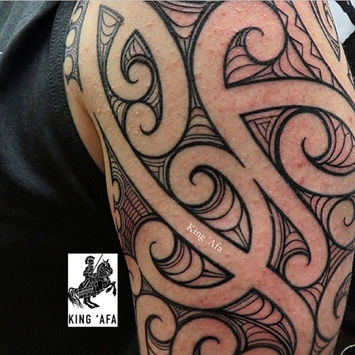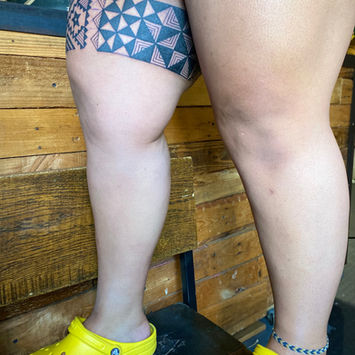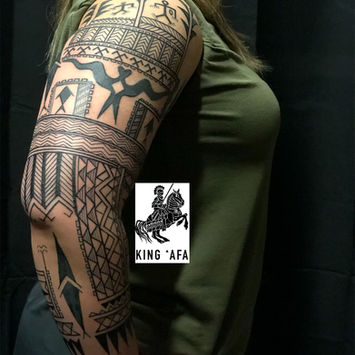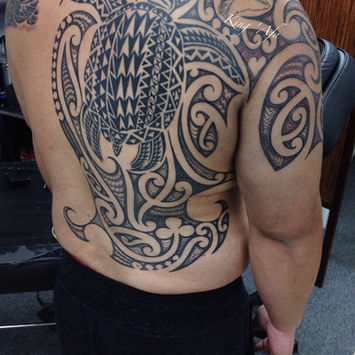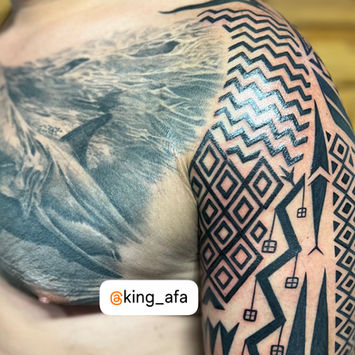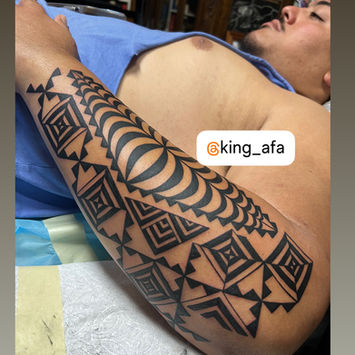top of page
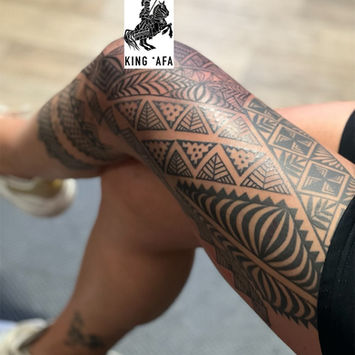
ABOUT MY MISSION
Global Cultural Tattoo Systems
Large-Scale Projects • Convention / Expo Bookings • Travel Sessions:
I’m King ‘Afa, a research-driven cultural tattoo artist working across Oceania, the Americas, Africa, Europe, and Asia. My focus is not “American tribal tattoo decoration”—it’s cultural structure: how line, pattern, spacing, and symbolism operate as a language tied to identity, land, lineage, and history.
Sleeves • Chest panels • Back pieces • Leg sleeves • Multi-session cultural layouts
Travel, licensing, and booth costs may apply. Deposit confirms dates and preparation.
Large Projects Only
This page is for clients seeking serious scale and multi-session planning.
Eligible project formats
-
Full sleeves / half sleeves
-
Chest panels + shoulder structures
-
Full back pieces / upper back panels
-
Leg sleeves (ankle to upper thigh)
-
Multi-session cultural layouts (full-body planning available)
-
If you’re ready for a Pacific Island Cultural composition museum-grade level of intention, luxury-art start your inquiry below.
Cultural Integrity Over “Generic Tribal”
I work from documented cultural knowledge and layout discipline. That means: -
No copy/paste flash and no internet “hybrid Polynesian patterns.”
-
No remixing sacred systems into decoration.
-
Every project is built from research, dialogue, and restraint—including knowing when a motif must be adapted or not used at all.
-
I maintain clear boundaries between cultural systems so the work stays honest.
-
The Cultural Tattoo Systems I Offer
Oceania / Pacific Ocean Systems (Core Specialty)
My foundation is the Pacific: Polynesia, Micronesia, and Melanesia—built from decades of study, mentorship, and lived cultural proximity.
Polynesian systems -
Tongan Tattoo: Kalia Tattoo - Tatatau Faka-Tonga frameworks follow Tonga cultural protocol not American Tongan TokoUso Faa Samoan Tongan Tattoo Edition
-
Samoan tattoo : tatau- pe'a & malu informed structure (context-driven, not templated American Westernize hybrids )
-
Fiji masi design tattoos of different tribes
Rotuma:
Niue:
Tokelau:
Tuvalu: -
Hawaii tattoo : kakau - informed Kanaka Maoli vs Local Hawaiian vs Haole
-
Aotearoa (New Zealand): Māori-tamoko and puhoro informed pathways with strict identity boundaries, Pakeha vs Kirituhi word
-
Marquesan tattoo - patutiki culture informed layout
Cook Islands; Mangaia , Aitutaki , Rarotonga
Rapa Nui Easter Islands -
Micronesian systems
-
Guam Chamorro / Saipan Rota Mariana Islands influences CNMI
-
FSM Federated States of Marianas: Yap, Chuuk, Pohnpei, Kosrae
-
Caroline Islands influences (used with restraint and context)
Nauru
Kiribati
Marshall Islands -
Melanesian systems
-
Papua- West Papua Asmat informed tribal arts
-
Kanak-informed directions (New Caledonia region)
-
Torres Strait-informed influences
-
Fiji regional arts (non-generic, region-sensitive)
-
Vanuatu + Solomon Islands + Tikopia + Anuta
The Americas (Pre-Columbian + Indigenous North America)
I approach Indigenous American visual language as systems of meaning, not decoration.
Meso-America + South America inspired frameworks (ancestry-led)
-
Inca-informed geometry and structure
-
Maya-informed pattern language
-
Aztec-informed symbolic structure
-
Olmec-inspired cultural references (when appropriate and ancestry-led)
Indigenous North America (client-led / consultation-led)
Over the years I’ve tattooed Indigenous clients connected to Native American nations across multiple regions, including examples such as:
-
Southeast: Cherokee, Choctaw, Seminole
-
Plains: Blackfeet, Cheyenne, Comanche
-
Southwest: Hopi, Diné (Navajo), Apache
-
California: Cahuilla and regional lineages
-
Alaska + Northwest Coast: Inupiat, Yupik, Haida
I do not generalize Indigenous symbolism into “tribal aesthetics.” Each cultural tattoo design is approached through research, dialogue, and restraint—recognizing when motifs must be adapted and when some should not be reproduced at all.
Africa Tribal Art + Caribbean Tribes Taino & Arawak (Heritage-Based, Consultation-Driven)
We maintain a private research library built from documented academic and museum-grade references. For clients with African or Caribbean lineage, We offer heritage-based contemporary tribal work that respects cultural boundaries and avoids generic pan-tribal mashups.
Caribbean Tribes systems
-
Taíno Tattoo - informed cultural frameworks (heritage-led)
Africa Tribal Art - informed contemporary tribal artwork
-
African tribal heritage-based geometric and symbolic systems
Adinkra symbols, ankh signs, tribal masks, or geometric patterns.
Yoruba of Nigeria
Cameroon, Gabon, the Congo Muslim Fulbe (Fulani) and Sudanese tribes of central Cameroon Tattooed Okak Fang tattoo designs -
Built through consultation, meaning, and documented references—not internet trend motifs
-
https://larskrutak.com/tattoos-of-sub-saharan-africa/
Europe + Mediterranean (Ancient + Tribal Arts)
For European lineage projects, I can build culturally grounded designs using documented historical art languages.
-
Scandinavia: Vikings -era inspired frameworks (line, Celtic knotwork logic , symbolic structure)
-
Anglo & Saxon - era inspired pattern language (heritage-led)
-
Ancient Rome: Roman motifs, Vatican art emblems, and historical symbolism (context-driven)
-
Ancient Greece: Greek art + mythology-informed storytelling (ancestry and meaning-led)
-
Mediterranean Sea cultural references for lineage-based projects
Asia (Central, East, South, Southeast)
For Asian lineage projects, I approach patterns as visual languages tied to region, history, and identity.
-
Tibet & Nepal Art - inspired cultural frameworks (heritage-led)
-
India lineage-based tribal art projects (region-specific; not generalized “Indian tribal”)
-
Persian & Arab art cultural references (historical / heritage-led)
-
Ancient Korea art and Ancient Japan inspired cultural frameworks (project-dependent)
-
Southeast Asia: Iban / Borneo cultural references (heritage-led, consultation-driven)
Why I Built a Global Cultural Tattoo Practice
I study cultural art systems because they reveal how humans have lived, navigated, traded, survived, built civilizations, and carried identity across oceans and continents.
In the art studio, clients don’t just receive a tattoo—they receive context: the history logic, the structure, and the cultural responsibility behind the work.
This is how cultural tattooing becomes more than style—it becomes education, respect, and legacy.
Booking: Convention / Expo / City Travel Sessions
Step 1 — Submit the inquiry
You must submit:
-
your city + event name (if applicable)
-
preferred months/ dates
-
project type (sleeve/back/chest/leg)
-
cultural heritage context + meaning
-
clear photos of the placement area
-
measurements in inches (length/width)
Step 2 — Deposit confirms dates + preparation
To confirm your convention/expo booking or travel session, a deposit is required. The deposit covers:
-
consultation + cultural planning
-
art preparation + layout engineering
-
travel logistics coordination
-
station / booth setup planning
Step 3 — Scheduling + execution
Once deposit is received, you receive a confirmed booking window and next steps for your multi-session plan.
Submit Inquiry + Deposit to Confirm

Discover the artistry of Polynesian tattoos designed by King 'Afa, a dedicated Tongan tattoo artist committed to preserving the authenticity of each unique #PacificIsland culture. Every project design reflects traditional #PolynesianTattoo, #MicronesianTattoo & #Melanesian #TribalArt and storytelling, blending heritage with creativity to honor the distinct beauty of our cultures. Explore a collection of other world cultural art , and celebrate the rich traditional art Pacific Islands cultures with unmatched craftsmanship.
#PolynesianTattooDesign #MaoriTattoo #SamoanTattoo #TonganTattoo #MarquesanTattoo #FijianMasiTattoos #HawaiiTattoo #Niue #WallisIsland #Uvea #Futuna #Tokelau #Tuvalu #Rotuma #TahitiTattoo #TainoTattoo #BlackWorkTattoos #AbstractTattoos #CoverUpTattoos #SingleNeedleTattoos
bottom of page



















.jpeg)







